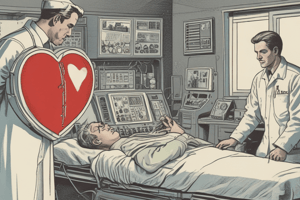Podcast
Questions and Answers
What is the primary product of hepatic metabolism of Lidocaine?
What is the primary product of hepatic metabolism of Lidocaine?
- CINCHONA bark
- Monoethlyglycinexylidide (MEGX) (correct)
- Theophylline
- N-acetylprocainamide (NAPA)
Which drug is derived from the leaves of foxglove plant and used to treat CHF and Atrial fibrillation or flutter?
Which drug is derived from the leaves of foxglove plant and used to treat CHF and Atrial fibrillation or flutter?
- Theophylline
- Disopyramide
- Quinidine
- Digoxin (correct)
What is the primary use of Amiodarone?
What is the primary use of Amiodarone?
- To treat ventricular arrhythmias that arise after AMI (correct)
- To control supraventricular and ventricular arrhythmias
- To treat chronic obstructive lung disease
- To treat neonatal apnea
What is the primary product of hepatic metabolism of lidocaine?
What is the primary product of hepatic metabolism of lidocaine?
Which drug is used to treat neonatal apnea?
Which drug is used to treat neonatal apnea?
Which drug is derived from the CINCHONA bark and can cause CINCHONISM syndrome?
Which drug is derived from the CINCHONA bark and can cause CINCHONISM syndrome?
What is the mechanism of action of Digoxin?
What is the mechanism of action of Digoxin?
What is the main adverse effect of Disopyramide?
What is the main adverse effect of Disopyramide?
What is the primary use of Amiodarone?
What is the primary use of Amiodarone?
What is the source of Quinidine?
What is the source of Quinidine?
What is the primary use of Lidocaine?
What is the primary use of Lidocaine?
What is the mechanism of action of Diazepam?
What is the mechanism of action of Diazepam?
What is the primary use of Carbamazepine?
What is the primary use of Carbamazepine?
What is the mechanism of action of Digoxin?
What is the mechanism of action of Digoxin?
What is the potential adverse effect of Disopyramide?
What is the potential adverse effect of Disopyramide?
What is the indication for Amiodarone?
What is the indication for Amiodarone?
What is the potential adverse effect of Aminoglycosides?
What is the potential adverse effect of Aminoglycosides?
What is the mechanism of action of Vancomycin?
What is the mechanism of action of Vancomycin?
What is the indication for Diazepam?
What is the indication for Diazepam?
What is the potential adverse effect of Carbamazepine?
What is the potential adverse effect of Carbamazepine?
Flashcards are hidden until you start studying
Study Notes
Overview of Common Drugs Used in Treatment of Cardiovascular and Neurological Disorders
- Theophylline, a methylated xanthine, is used to relax bronchial smooth muscle for bronchodilation in patients with chronic obstructive lung disease and neonatal apnea.
- Digoxin, a cardiac glycoside from foxglove plant, inhibits membrane NA-K-ATPase pump to improve myocardial contraction and is used for CHF and atrial fibrillation/flutter.
- Disopyramide, used for ventricular arrhythmias, has anticholinergic effects causing dryness of mouth, nose, throat, eyes, urinary retention, blurred vision, and mental depression.
- Lidocaine, an anti-arrhythmic and local anesthetic, treats ventricular arrhythmias after AMI and is metabolized to Monoethlyglycinexylidide (MEGX), which should be considered in TDM.
- Quinidine, derived from CINCHONA bark, is used for supraventricular and ventricular arrhythmias, but can cause CINCHONISM syndrome due to its cardiac depressant properties.
- Procainamide, converted to N-acetylprocainamide (NAPA) in the liver, is potent in controlling supraventricular and ventricular arrhythmias.
- Amiodarone treats life-threatening ventricular tachyarrhythmias unresponsive to less toxic agents.
- Aminoglycosides interfere with bacterial protein synthesis and are commonly administered via IV or IM route, but can cause ototoxicity and nephrotoxicity.
- Vancomycin inhibits bacterial cell wall synthesis and can cause "red man syndrome" (erythemic flushing of extremities).
- Phenytoin, an anticonvulsant, is used to control seizure disorders and to treat "status epilepticus".
- Diazepam, a benzodiazepine tranquilizer, is used as a sedative, antianxiety agent, muscle relaxant, and immediate "rapid" control of seizures in emergency situations.
- Phenobarbital and primidone, barbiturates, are frequently used to treat different types of seizures by decreasing the threshold of nerve cell stimulation in the motor cortex.
- Carbamazepine is effective in controlling grand mal and psychomotor seizures and in relieving pain with trigeminal neuralgia, but can cause chronic adverse effects such as rash, hepatic failure, and leukopenia.
Studying That Suits You
Use AI to generate personalized quizzes and flashcards to suit your learning preferences.





